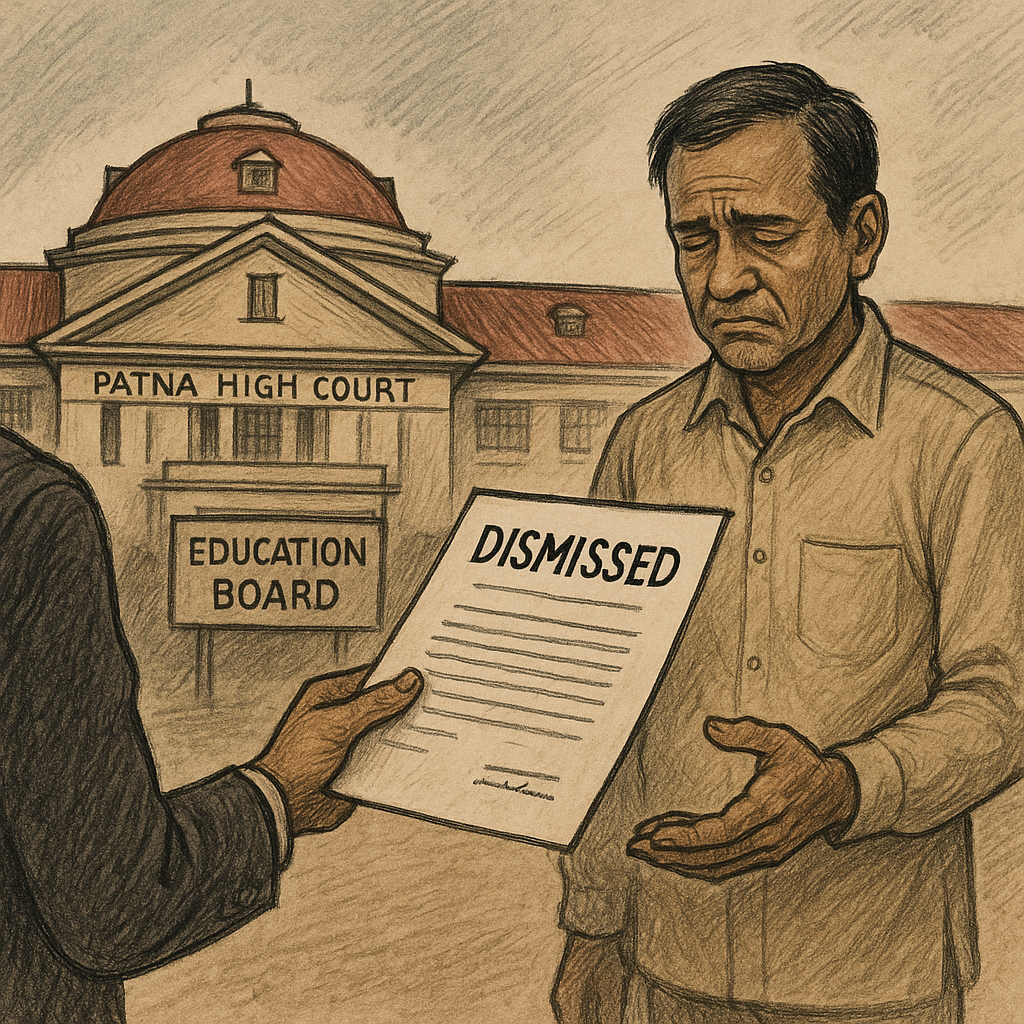The Patna High Court has dismissed a writ petition challenging an order of dismissal passed by the Bihar School Examination Board (BSEB) against a Class-III employee following his conviction in a CBI case. The Court, per Hon’ble Mr. Justice Harish Kumar, delivered a reasoned judgment on 19 December 2024, reaffirming that once a government servant’s conduct leads to criminal conviction, the disciplinary authority can impose major penalties—without holding a full-fledged departmental inquiry—subject to limited safeguards and constitutional scrutiny.
The petitioner (a former Section Officer) questioned the validity of the dismissal on multiple grounds: lack of competence of the signatory (Secretary, BSEB), alleged delay, and the effect of suspension of sentence by the Himachal Pradesh High Court in the underlying criminal case. The High Court declined interference and sustained the dismissal.
Simplified Explanation of the Judgment
The employee (petitioner) began service in 1988 and rose to Section Officer. He was later prosecuted by the CBI for extortion and record manipulation during verification of an Intermediate certificate. A trial court convicted him in 2014 for offences under Sections 120B, 420, 467, 468, 471 and 201 IPC, awarding custodial sentences and fines. His appeal was dismissed in 2019, though the Himachal Pradesh High Court subsequently suspended the sentence while a criminal revision was pending. In 2019, the BSEB dismissed him, prompting the present writ.
The petitioner argued that (i) only the Chairman—not the Secretary—could dismiss a Class-III employee under Rule 52 of the 1964 BSEB Regulations; (ii) the show-cause was issued by a Deputy Secretary lacking authority; (iii) since the sentence was suspended and the revision was pending, dismissal was impermissible; and (iv) departmental proceedings were mandatory in view of a 2007 Government circular.
The BSEB responded that the Secretary acted with prior approval of the Chairman as permitted by Regulation 1(e) of Chapter VII, which authorises the Secretary—subject to Chairman’s approval—to appoint, dismiss, and take disciplinary action regarding ministerial staff. The record showed Chairman’s approval dated 24.06.2019 before issuing the dismissal on 29.06.2019. The BSEB also narrated its actions from 2014 onward: issuing show-cause, appointing an Enquiry Officer (who deferred because the criminal case was pending), receiving intimation of conviction in 2016, seeking explanation, considering the reply, and then dismissing the employee under Article 311(2)(a).
After reviewing the file, the Court accepted that prior approval of the Chairman existed, curing the competence objection. Thus, the Secretary’s order was valid under Regulation 1(e).
On the central question—whether a full departmental inquiry was mandatory—the Court reproduced Article 311(2) and its proviso (a), clarifying that where the dismissal is “on the ground of conduct which has led to conviction on a criminal charge,” a regular inquiry with charge-framing and evidence is not required. However, limited due process, such as notice and an opportunity to explain why a particular penalty should or should not be imposed, is compatible with the constitutional framework and the Bihar Government Servant Rules.
The Court then addressed the impact of the suspended sentence and pending revision. Relying on binding Supreme Court authority, it held that suspension of sentence does not erase the conviction. Therefore, action under Article 311(2)(a) need not await the final outcome of appeal or revision. If ultimately acquitted, restoration and consequential benefits can be granted; but until then, the employer need not retain in service a person convicted of serious offences.
Finally, the Court rejected the delay argument and the claim that the 2007 circular made departmental proceedings compulsory. It explained that circulars are guidelines and cannot override the Constitution or the statutory scheme; moreover, the record revealed a consistent sequence of steps from show-cause to dismissal, especially after the conviction was affirmed in 2019.
In conclusion, the writ petition was dismissed.
Significance or Implication of the Judgment (For general public or government)
This decision restates a critical principle in service law: where a government employee’s conduct leads to criminal conviction, the employer is empowered to impose a major penalty such as dismissal under Article 311(2)(a) without a full departmental trial-type inquiry. Public authorities must still act fairly—typically by issuing a show-cause notice on the proposed penalty and considering the reply—but they are not compelled to re-litigate the criminal wrongdoing in a departmental forum.
For the public, the judgment underscores the system’s intolerance for corruption and fraud within public institutions that manage sensitive functions like academic certification. For departments and boards, it offers a clear compliance roadmap: (i) verify competence of the signatory (or obtain Chairman/competent authority approval where regulations so require), (ii) issue a penalty show-cause referring to the conviction, (iii) assess proportionality, and (iv) pass a speaking order. It also clarifies that suspension of sentence is not a legal barrier to dismissal; the employer is not bound to wait for all appellate remedies to end. If the conviction is later set aside, restoration can follow—meaning the rule balances administrative integrity with individual rights.
Legal Issue(s) Decided and the Court’s Decision with reasoning
- Whether the Secretary, BSEB, could sign the dismissal of a Class-III employee
• Decision: Yes, because Regulation 1(e) of Chapter VII authorises the Secretary to dismiss ministerial staff with prior approval of the Chairman; such approval existed and was placed on record. - Whether a regular departmental inquiry is mandatory when dismissal is based on criminal conviction
• Decision: No. Under Article 311(2)(a), a full inquiry is unnecessary where the penalty is grounded in conduct leading to conviction. Courts have nevertheless recognised the propriety of issuing notice on the proposed penalty. - Whether suspension of sentence and pendency of revision/appeal bar dismissal
• Decision: No. Suspension of sentence does not obliterate conviction; disciplinary action under Article 311(2)(a) may proceed without waiting for final appellate outcomes. If the employee is later acquitted, the order can be revised and benefits restored. - Whether the 2007 Government circular mandating departmental proceedings controls over constitutional and statutory provisions
• Decision: No. Circulars are guidelines and cannot override Article 311(2)(a) or the governing Regulations. - Whether the dismissal order suffered from delay and laches
• Decision: No. The record showed progressive steps, and the conviction was affirmed in 2019; the petitioner was given show-cause and opportunity before dismissal.
Judgments Referred by Parties (with citations)
- Division Bench of Patna High Court in LPA No. 1111 of 2000 (Shio Bihari Rai v. State of Bihar & Anr.)—Article 311 protection not applicable when dismissal is based on conviction.
Judgments Relied Upon or Cited by Court (with citations)
- S. Nagoor Meera, (1995) 3 SCC 377—Suspension of sentence does not suspend conviction; employer may proceed under Article 311(2)(a).
- Shankar Dass v. Union of India, (1985) 2 SCC 358—Penalty must be fair, just, and reasonable; proportionality applies.
- State of Tamil Nadu & Ors. v. K. Guruswamy, (1996) 7 SCC 114—Principles on proceeding post-conviction reaffirmed.
- Union of India & Ors. v. Ramesh Kumar, (1997) 7 SCC 514—Action based on conviction remains valid despite suspension of sentence.
- Suryadeo Singh v. State of Bihar, (2011) 1 PLJR 28—Even when full inquiry is dispensed with, the employee may be given opportunity to represent on the proposed penalty under Rule 20.
- Subrata Basu v. State of Bihar, (2013) 3 PLJR 608—Reaffirms integrity obligations under Conduct Rules and consequences of conviction.
- Sarju Prasad Singh v. State of Bihar, 1987 PLJR 285—Conviction for grave offences involves moral turpitude, violating Conduct Rules.
Case Title
Mithilesh Prasad v. The State of Bihar & Ors.
Case Number
Civil Writ Jurisdiction Case No. 5099 of 2020
Citation(s)
2025 (1) PLJR 574
Coram and Names of Judges
Hon’ble Mr. Justice Harish Kumar (CAV Judgment dated 19.12.2024)
Names of Advocates and who they appeared for
For the petitioner: Mr. Manik Vedsen, Advocate
For the respondent (BSEB): Mr. Siddhartha Prasad, Advocate
Link to Judgment
MTUjNTA5OSMyMDIwIzEjTg==-AnY1tORsRVg=
If you found this explanation helpful and wish to stay informed about how legal developments may affect your rights in Bihar, you may consider following Samvida Law Associates for more updates.








